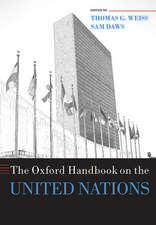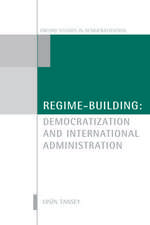The United Nations and the Development of Collective Security: The Delegation by the UN Security Council of its Chapter VII Powers: Oxford Monographs in International Law
Autor Dan Sarooshien Limba Engleză Hardback – 18 mar 1999
| Toate formatele și edițiile | Preț | Express |
|---|---|---|
| Paperback (1) | 485.50 lei 31-37 zile | |
| OUP OXFORD – 3 aug 2000 | 485.50 lei 31-37 zile | |
| Hardback (1) | 1404.18 lei 31-37 zile | |
| Clarendon Press – 18 mar 1999 | 1404.18 lei 31-37 zile |
Din seria Oxford Monographs in International Law
- 19%
 Preț: 679.35 lei
Preț: 679.35 lei - 30%
 Preț: 658.92 lei
Preț: 658.92 lei - 21%
 Preț: 592.91 lei
Preț: 592.91 lei - 30%
 Preț: 539.57 lei
Preț: 539.57 lei - 26%
 Preț: 660.80 lei
Preț: 660.80 lei - 30%
 Preț: 663.08 lei
Preț: 663.08 lei - 21%
 Preț: 595.11 lei
Preț: 595.11 lei - 25%
 Preț: 658.59 lei
Preț: 658.59 lei - 27%
 Preț: 370.44 lei
Preț: 370.44 lei - 34%
 Preț: 1347.24 lei
Preț: 1347.24 lei - 27%
 Preț: 378.60 lei
Preț: 378.60 lei - 34%
 Preț: 1316.26 lei
Preț: 1316.26 lei - 34%
 Preț: 862.62 lei
Preț: 862.62 lei - 28%
 Preț: 485.50 lei
Preț: 485.50 lei - 18%
 Preț: 335.79 lei
Preț: 335.79 lei - 30%
 Preț: 600.85 lei
Preț: 600.85 lei - 17%
 Preț: 357.57 lei
Preț: 357.57 lei - 31%
 Preț: 400.01 lei
Preț: 400.01 lei - 34%
 Preț: 719.40 lei
Preț: 719.40 lei - 8%
 Preț: 425.80 lei
Preț: 425.80 lei - 30%
 Preț: 1145.50 lei
Preț: 1145.50 lei - 12%
 Preț: 472.49 lei
Preț: 472.49 lei - 30%
 Preț: 818.86 lei
Preț: 818.86 lei - 34%
 Preț: 603.33 lei
Preț: 603.33 lei - 28%
 Preț: 496.88 lei
Preț: 496.88 lei - 34%
 Preț: 970.38 lei
Preț: 970.38 lei - 19%
 Preț: 421.08 lei
Preț: 421.08 lei - 30%
 Preț: 887.10 lei
Preț: 887.10 lei - 18%
 Preț: 347.53 lei
Preț: 347.53 lei - 19%
 Preț: 345.83 lei
Preț: 345.83 lei - 27%
 Preț: 343.41 lei
Preț: 343.41 lei - 34%
 Preț: 719.71 lei
Preț: 719.71 lei - 31%
 Preț: 393.71 lei
Preț: 393.71 lei - 34%
 Preț: 1111.19 lei
Preț: 1111.19 lei - 33%
 Preț: 606.97 lei
Preț: 606.97 lei - 31%
 Preț: 472.87 lei
Preț: 472.87 lei - 27%
 Preț: 422.60 lei
Preț: 422.60 lei - 28%
 Preț: 418.39 lei
Preț: 418.39 lei - 30%
 Preț: 821.77 lei
Preț: 821.77 lei - 48%
 Preț: 467.95 lei
Preț: 467.95 lei - 18%
 Preț: 337.91 lei
Preț: 337.91 lei - 27%
 Preț: 598.45 lei
Preț: 598.45 lei - 30%
 Preț: 589.60 lei
Preț: 589.60 lei - 50%
 Preț: 834.70 lei
Preț: 834.70 lei - 30%
 Preț: 864.33 lei
Preț: 864.33 lei
Preț: 1404.18 lei
Preț vechi: 2137.42 lei
-34% Nou
Puncte Express: 2106
Preț estimativ în valută:
268.77€ • 292.05$ • 225.92£
268.77€ • 292.05$ • 225.92£
Carte tipărită la comandă
Livrare economică 10-16 aprilie
Preluare comenzi: 021 569.72.76
Specificații
ISBN-13: 9780198268635
ISBN-10: 0198268637
Pagini: 334
Dimensiuni: 163 x 243 x 23 mm
Greutate: 0.63 kg
Editura: Clarendon Press
Colecția Clarendon Press
Seria Oxford Monographs in International Law
Locul publicării:Oxford, United Kingdom
ISBN-10: 0198268637
Pagini: 334
Dimensiuni: 163 x 243 x 23 mm
Greutate: 0.63 kg
Editura: Clarendon Press
Colecția Clarendon Press
Seria Oxford Monographs in International Law
Locul publicării:Oxford, United Kingdom
Recenzii
contains a thorough and meticulous analysis of the legal implications of the doctrine of delegation when applied in the field of collective security ... this book is a valuable contribution to the literature on the UN collective security system
The strength of the study lies in the thoroughness of analysis demonstrated throughout the work. ...an impressively constructed piece of scholarly research. ...a practitioner's guide foe both academics and diplomats on the subject of Chapter VII delegations of a power. With sweeping efficiency, Sarooshi makes sense out of a previously nebulous corpus of Security Council practice, in the process creating a comprehensive benchmark for the comparison of all future Chapter VII delegations.
The attraction to the author's method is its simplicity, and it is a simplicity that belies an ability to resolve even the most complex issues. Once the theoretical structure is erected, Sarooshi can turn to analyze actual situations armed with an analytical tool of the first rate. Sarooshi's trenchant work, besides providing an invaluable analytical tool, is a remarkable compilation of UN practice and an immensely helpful legal resource.
the examination is impressive. there can be no doubt that this study constitutes an invaluable addition to the body of knowledge in this constantly evolving area.
impressive study The book stands out from others for its imaginativeness and thoughtfulness, and the mastery of a vast and complex practice of the Security Council over more than 50 years. Danesh Sarooshi develops indeed no less than a 'theory of legitimate delegation.
Dr Sarooshi has provided an elaborate analytical tool to examine Security Council practice and applied it sharply and perceptively. it is an exercise well-worth attempting and carried out in a most accomplished way.
The United Nations and The Development of Collective Security is a timely, scholarly and original contribution to the ever increasing volume of post cold war literature om the United Nations and collective security... Dr. Sarooshi's approach to collective security is based on an impeccable analysis of the law of international institutions... It is impossible in so short a space to do justice to the depth of Sarooshi's analysis... The United nations and the The Development of Collective Security... posits a clear and convincing framework by which to assess the legality of Security Council practice. As a result, what at first glance appears to be disparate and confusing Security Council practice, is subjected to rigorous and clear legal analysis.
The high degree of conceptual clarity in a work that deals with the most complex aspects of the maintainance of international peace and security is the key to the book's success.
The strength of the study lies in the thoroughness of analysis demonstrated throughout the work. ...an impressively constructed piece of scholarly research. ...a practitioner's guide foe both academics and diplomats on the subject of Chapter VII delegations of a power. With sweeping efficiency, Sarooshi makes sense out of a previously nebulous corpus of Security Council practice, in the process creating a comprehensive benchmark for the comparison of all future Chapter VII delegations.
The attraction to the author's method is its simplicity, and it is a simplicity that belies an ability to resolve even the most complex issues. Once the theoretical structure is erected, Sarooshi can turn to analyze actual situations armed with an analytical tool of the first rate. Sarooshi's trenchant work, besides providing an invaluable analytical tool, is a remarkable compilation of UN practice and an immensely helpful legal resource.
the examination is impressive. there can be no doubt that this study constitutes an invaluable addition to the body of knowledge in this constantly evolving area.
impressive study The book stands out from others for its imaginativeness and thoughtfulness, and the mastery of a vast and complex practice of the Security Council over more than 50 years. Danesh Sarooshi develops indeed no less than a 'theory of legitimate delegation.
Dr Sarooshi has provided an elaborate analytical tool to examine Security Council practice and applied it sharply and perceptively. it is an exercise well-worth attempting and carried out in a most accomplished way.
The United Nations and The Development of Collective Security is a timely, scholarly and original contribution to the ever increasing volume of post cold war literature om the United Nations and collective security... Dr. Sarooshi's approach to collective security is based on an impeccable analysis of the law of international institutions... It is impossible in so short a space to do justice to the depth of Sarooshi's analysis... The United nations and the The Development of Collective Security... posits a clear and convincing framework by which to assess the legality of Security Council practice. As a result, what at first glance appears to be disparate and confusing Security Council practice, is subjected to rigorous and clear legal analysis.
The high degree of conceptual clarity in a work that deals with the most complex aspects of the maintainance of international peace and security is the key to the book's success.
Notă biografică
Dan Sarooshi is Senior Lecturer in Public international law at University College London






















